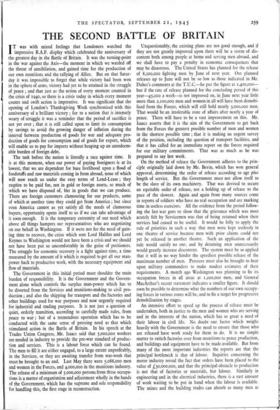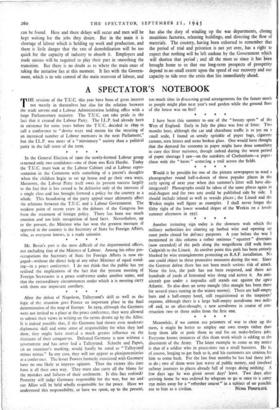THE SECOND BATTLE OF BRITAIN I T was with mixed feelings
that Londoners watched the impressive R.A.F. display which celebrated the anniversary of the greatest day in the Battle of Britain. It was the turning-point in the war against the Axis—the moment in which we warded off the threat of annihilation, and gained time for .the production of our own munitions and the rallying of Allies. But on that Satur- day it was impossible to forget that while victory had been won in the sphere of arms, victory had yet to be attained in the struggle of peace ; and that just as the action of every moment counted in the crisis of 1940, so there is a crisis today in which every moment counts and swift action is imperative. It was significant that the opening of London's Thanksgiving Week synchronised with this anniversary of a brilliant victory ; for to a nation that is intensely weary of struggle it was a reminder that the period of sacrifice is not yet over ; that it is still called upon to limit its consumption by savings to avoid the growing danger of inflation during the interval between production of goods for war and adequate pro- duction of goods for consumption and of goods for export, which will enable us to pay for imports without heaping up an unredeem- able burden of foreign debt.
The task before the nation is literally a race against time. It is at this moment, when our power of paying foreigners is at its lowest, that we are dependent for bare livelihood upon a flood of foodstuffs and raw materials coming in from abroad, none of which will now reach us under the easy terms of Lend-Lease ; they reqnire to be paid for, not in gold or foreign assets, so much of which we have disposed of, bin in goods that we can produce. There are foreign customers clamouring for our products, some of which at another time they could get from America ; but since even America cannot as yet satisfy all the needs of clamorous buyers, opportunity opens itself to us if we can take advantage of it soon enough. It is the temporary extremity of our need which above all things hampers our representatives who are negotiating on our behalf in Washington. If it were not for the need of gain- ing time to recover, the crisis which sent Lord Halifax and Lord Keynes to Washington would not have been a crisis and we should not have been put so uncomfortably in the guise of petitioners. The struggle for economic recovery is a fight against time, a time measured by the amount of it which is required to get all our man- power back to productive work, with the necessary equipment and flow of materials.
The Government in this initial period must shoulder the main burden of responsibility. It is the Government and the Govern- ment alone which controls the surplus man-power which has to be diverted from the Services and munitions-making to civil pro- duction ; and also the shipping for transport and the factories and other buildings used for war purposes and now urgently required for industrial and trading purposes. It is not just a question of quiet, orderly transition, according to carefully made rules, from peace to war ; but of a tremendous operation which has to be conducted with the same sense of pressing need as that which stimulated action in the Battle of Britain. In his speech at the Trades Union Congress, Mr. Isaacs said that 5,000,000 workers are needed in industry to provide the pre-war standard of produc- tion and services. This is a labour force which can be found. The men to fill it are either engaged, to a large extent unprofitably, in the Services, or they are awaiting transfer from war-work that must be brought to an end. Last May there were 5,086,000 men and women in the Forces, and 4,000,000 in the munitions industry. The release of a minimum of 5,000,000 persons from these occupa- tions is a matter of organisation and adjustment wholly in the hands of the Government, which has the supreme and sole responsibility for handling this, the first stage in reconstruction. Unquestionably, the existing plans are not good enough, and if they are not greatly improved upon there will be a storm of dis- content both among people at home and serving men abroad, and we shall have to pay a penalty in economic consequences that may be disastrous. The United States has planned for the release of 8,zoo,000 fighting men by June of next year. Our planned releases up to June will not be so low as those indicated in Mr. Dukes's comments at the T.U.C.—he put the figure at 1,400,000— but if the rate of release planned for the concluding period of this year-45,000 a week—is not improved on, in June next year little more than 2,100,000 men and women in all will have been demobi- lised from the Forces, which will still hold nearly 3,000,000 men. That would be an intolerable state of affairs after nearly a year of peace. There will have to be a vast improvement on this. Mr. Isaacs asserts that it is the aim of the Government to get back from the Forces the greatest possible number of men and women in the shortest possible time ; that it is making an urgent survey of the position, including the question of transport facilities, and that it has called for an immediate report on the forces required for our military commitments. That was as much as he was prepared to say last week.
On the method of release the Government adheres to the prin- ciple originally laid down by Mr. Bevin, which has won general approval, determining the order of release according to age plus length of service. But the Government must not allow itself to be the slave of its own machinery. That was devised to secure an equitable order of release, not a holding up of release to the pace of the slowest. Again and again from many sources come in reports of soldiers who have no real occupation and are marking time in useless exercises. All the evidence from the period follow- ing the last war goes to show that the grievance which was most acutely felt by Servicemen was that of being retained when their services had ceased to be useful. It would be folly to apply the rule of priorities in such a way that men were kept uselessly in one theatre of service because men with prior claims could not yet be released in another theatre. Such an application of the rule would satisfy no one, and by detaining men unnecessarily would greatly increase discontent. The system must be so applied that it will in no way hinder the speediest possible release of the maximum number of men. Pressure must also be brought to bear upon military commanders to make modest estimates of their requirements. A month ago Washington was planning to fix its occupation forces in all areas at 1,zoo,000 men, and General MacArthur's recent statement indicates a smaller figure. It should soon be possible to determine what the numbers of our own occupy- ing forces in various zones will be, and to fix a target for progressive demobilisation by stages.
An intensive effort to speed up the process of release must be undertaken, both in justice to the men and women who are serving and in the interests of the nation, which has so great a need of their labour in civil life. No doubt one factor which weighs heavily with the Government is the need to ensure that those who are released have work ready for them to do. It is no simple matter to switch factories over from munitions to peace production, and buildings and equipment have to be made available. But from many of the most important industries the reports are that the principal bottleneck is that of labour. Inquiries concerning the motor industry reveal the fact that orders have been placed to the value of L30,000,000, and that the principal obstacle to production is not that of factories or materials, but labour. Similarly in engineering and in the electrical industries, there is a vast amount of work waiting to be put in hand when the labour is available. The mines and the building trades can absorb as many men as can be found. Here and there delays will occur and men will be kept waiting for the jobs they desire. But in the main it is shortage of labour which is 'holding up work and production, and there is little danger that the rate of demobilisation will be too quick for the capacity of industry to absorb it. Employers and trade unions will be required to play their part in smoothing the transition. But there is no doubt as to where the main onus of taking the initiative lies at this moment. It lies with the Govern- ment, which is in sole control of the main reservoir of labour, and has also the duty of winding up the war departments, closing munitions factories, releasing buildings, and directing the flow of materials. The country, having been exhorted to remember that the period of trial and privation is not yet over, has a right to expect that nothing will be left undone by the Government which will shorten that period ; and all the more so since it has been brought home to us that our long-term prospects of prosperity depend to no small extent upon the speed of our recovery and our capacity to tide over the crisis that lies immediately ahead.























 Previous page
Previous page